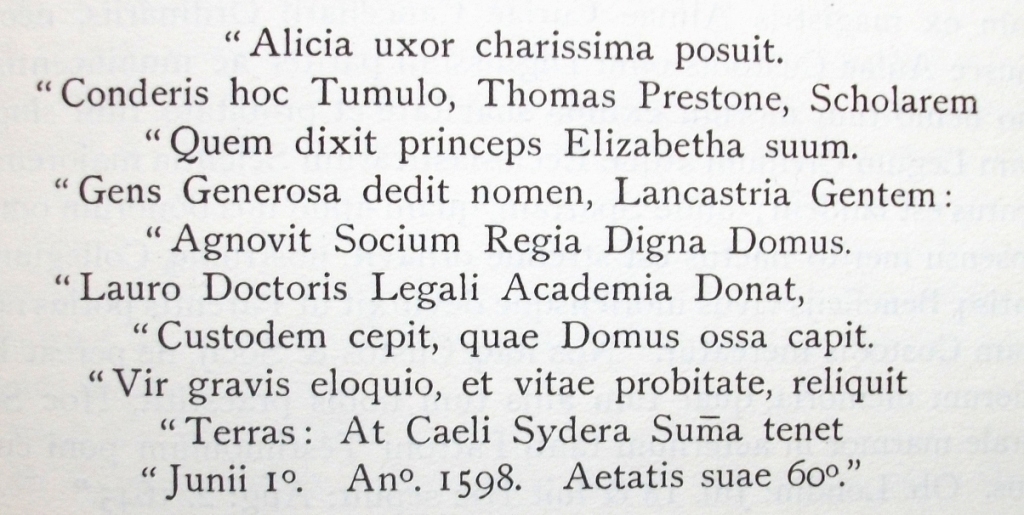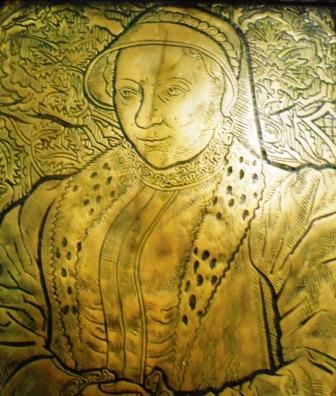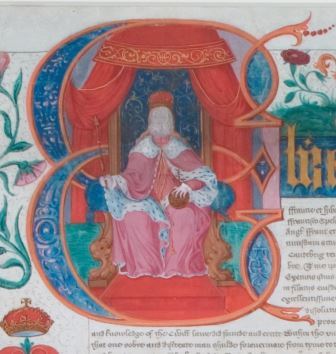This post continues our celebration of the THwomen40 anniversary and looks at the importance of two women in the life of Thomas Preston, a former Master of Trinity Hall.
The ante-chapel of Trinity Hall contains two monumental brasses, situated just a few feet apart, of Walter Hewke (Master 1512-1517/18) and Thomas Preston (Master 1585-1598). Preston’s brass is particularly interesting for the Latin inscription which contains the names of two women, Alicia and Elizabeth. Who were they and what role did they play in his life?

Alicia’s inscription on Preston’s brass (from Warren’s Book)
Alicia
Thomas Preston has the distinction of being the first married Master of Trinity Hall! He was educated at Eton and King’s College Cambridge (1556-81) and it seems likely that he resigned his fellowship at King’s in order to marry Alicia. By this time Heads of Houses, unlike fellows, were allowed to marry but it is not clear whether Preston lived with his wife in College. According to Crawley, “The fact that Preston was buried in the ante-chapel does not prove that he resided in College, but his widow at least ensured that she would not be forgotten, for the inscription on his monument begins with her name ALICIA, alone on the first line.” In her inscription Alicia leaves us in no doubt about her importance in Preston’s life!

Might Alicia have looked like this ?
We know little about Alicia and do not have an image of her. However, we can speculate that as a woman of some standing she might have looked something like the wealthy woman depicted in this brass in a church in Bruges (above).
Elizabeth I
Elizabeth, the other woman mentioned in the inscription, was in fact the Queen of England! Preston first came to the Queen’s attention as young fellow of King’s at the time of her stay in Cambridge in August 1564. This was a gala occasion for both town and gown, with speeches, disputations, religious services, banquets and plays. Preston impressed Elizabeth I with his “gracefull gesture” and “propernesse of person” in his role in the play of “Dido” which was put on for her entertainment at King’s College. He also excelled in a disputation before the Queen on the subject “monarchy is the best form for a state” (and he had the delicate task of speaking against the motion!) and in his oration at her departure from Cambridge. Elizabeth I was so taken with him that she called him “her scholar” and gave him a pension of £20 a year, a substantial sum in those days.

Elizabeth I, detail from the charter re-confirming Trinity Hall’s foundation (1559)
And she did not forget him! Many years later in 1585, when the Mastership of Trinity Hall fell vacant, Lord Burghley wrote to the fellows of Trinity Hall staying the election of a new Master. A few days later the fellows were instructed by royal mandate to elect Thomas Preston. The brass, which records that Elizabeth I called him “her scholar”, pays tribute to the importance of the Queen’s patronage in Preston’s fortunes.
Postscript
As Master, Preston set to work to sort out a number of problems including the College’s parlous finances which were burdened with debts “desperate to be remedied”. He was Vice-Chancellor, 1589-90, and was admitted an advocate in the Court of Arches in 1591. Perhaps he is best known today as the author of the play “Cambises King of Persia” which was lampooned by Shakespeare through the words of Falstaff in Henry IV, part I. His name lived on in Trinity Hall’s drama group, the Preston Society.
Over time the memory of Preston’s achievements may fade, but the inscription on his brass ensures that the importance of Alicia and Elizabeth in his life is recorded for posterity!
References
This post is an extended version of an article published in Front Court, Issue 21, Spring 2015.
For more about the visit of Queen Elizabeth I to Cambridge see the related post Vivat Regina!
Thomas Preston, The lamentable tragedie, mixed full of pleasant mirth containing the life of Cambyses king of Percia, Tudor Facsimile texts (London, 1910)
Charles Crawley, Trinity Hall. The History of a Cambridge College (Cambridge, 1976)